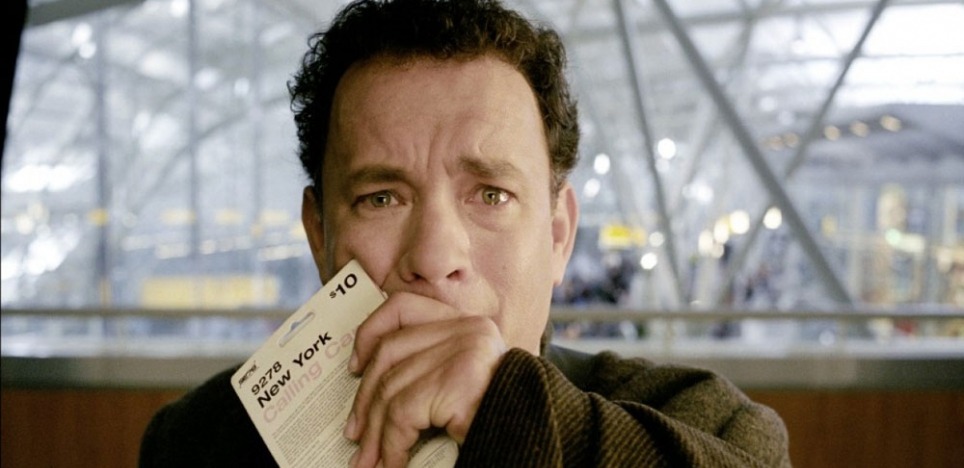International airports are busy places filled with anxious people in a hurry to get to their destinations. Others are living in a sort of dream-state brought on by jet lag. To find a calm person with a gift for patience in such a place is a miracle. Viktor Nagorski, a resourceful man from small Eastern European country, finds himself stranded in the international transit lounge at New York's Kennedy airport in Steven Spielberg's film The Terminal. Here is a light-hearted and character-driven parable about the art of waiting that illustrates the truth of the African proverb that says a patient man has all the wealth in the world. Viktor is a very rich man in this regard and those who join him on his nine-month stay in the terminal will find themselves enriched in many ways as well.
This Values & Visions Guide contains questions and exercises on your experiences in airports, practicing patience, cultivating resiliency, being fast or being last, the gift of listening to others, dealing with difficult people, and waiting as a spiritual practice. The film runs 129 minutes and is rated PG-13 for brief language and drug references. For our review and a plot synopsis, click here.
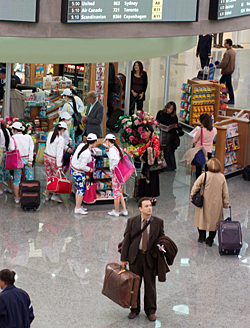
1. Your Experiences in Airports
"What makes the airport special, though — something different from any souvenir store in Universal City or Warner Bros. store worldwide — is that it is a gift store with culture shock; the product, in its video arcades, its hotels, and its cocktail lounges, of a mixed marriage between a border crossing and a shopping mall. And the confusions of any shop where people are surrounded by signs they can't read and people they can't follow are amplified in this place where so many customers are from somewhere far away, and so many of the shopkeepers are recent arrivals with a shaky hold on English. Things get lost in translation in airports, and the whole cross-cultural drama is stirred up by the fact that many of the people in airports are in something of a dream state," writes Pico Iyer in The Global Soul: Jet Lag, Shopping Malls, and the Search For Home.
- What are your first impressions of Viktor as he begins his long stay in the international transit lounge at JFK? How well do you think Dixon explains what has happened and what the rules force him to do with Viktor?
- Are you a regular user of airports? What scenes in the film came close to things you have experienced in these environments? Share a story about some aspect of your personality that came to the surface while standing in the ticket line, passing through security, getting food, waiting in the lounge, or boarding a plane.
2. Practicing Patience
"Patience is not only a virtue, but an attitude to life which can be achieved solely through attention to the inner journey," notes Mike Riddell in Sacred Journey. He continues: "I have to confess that I am not one to whom patience comes naturally. Rather than waiting quietly for doors to open, my instinct is to race forward and tear them off their hinges to see what lies behind them. . . . I have been slowly and incrementally learning that all my desperation to lay hold of the future does little except devalue the present. . . . Patience is something that is chosen; it is an active and intentional waiting which grows from an attitude of trust towards the essential goodness of life. It is a craft that must be learned through practice. It seems to me that every time I learn to extend my patience a little further, some new event will come along which stretches me just that bit more than I am prepared to go. I suspect that is the only way to develop patience — similar to athletes who incrementally increase their performances."
- When does Viktor first make it clear that he is a patient man unwilling to react to things in haste or in anger? Which characters in the drama most sorely test his patience?
- Think back to some of your experiences in airports (or elsewhere) that tested your patience. Share the story, then assess how the experience has tempered your impatience. What spiritual practices help you to incrementally practice patience in your daily life?
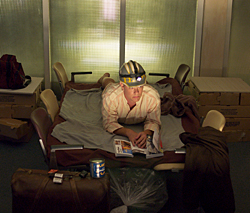
3. Cultivating Resiliency
In The Cosmic Dance, Christian writer Joyce Rupp writes: "Resiliency is rooted in the human heart. It is an essential catalyst for moving through painful and devastating experiences. Resiliency is about being down and out and springing back, being persistent in the face of defeat. It is solidarity with others that strengthens the soul. It is the hope that holds on in spite of overwhelming loss."
- Although Viktor lacks a full command of the English language, he manages to demonstrate a remarkable resiliency during his nine-month stay in the international transit lounge. What character qualities fortify this capacity to bounce back in the face of setbacks and repeated difficulties?
- Spiritual writer Joyce Rupp is convinced that resiliency is rooted in the human heart. What emotions do you connect with resiliency? Who is the most resilient person you have ever known? What makes him/her different from others? Some point to daily meditation as a practice that can lead to resiliency. What practices have helped you develop more resiliency?
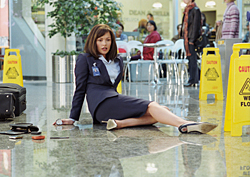
4. Be Fast or Be Last
In A Sideways Look at Time, Jay Griffiths writes, "The attraction to speed is only partly the exhilaration of acceleration; it has much to do with competition, with overtaking. One California management consultant, an expert on time-based competition, says 'Be Fast or Be Last.' The thrill is not in going fast, but in going faster than the test. This excitement is not recognized in all societies: to the Kabyle people in Algeria, and many others, speed is considered both indecorous and demonically over-competitive."
- Although Viktor takes his time with things, even he tries to speed up, and he winds up sliding on the newly waxed floor. Gupta, the Indian janitor, derives much humor from watching people ignore the caution cones which he puts up around the area he has just finished. What other scenes in the film demonstrate the drawbacks to speed as a way of living? Discuss Amelia's character and how speed has inhibited her relationships with others.
- Americans seem to be addicted to rushing around and, as a result, often feel the physical and psychological drawbacks of a life of constant haste. What foreign cultures have you experienced that emphasize values other than speed? What spiritual practices are you presently doing that help you slow down and enjoy the present moment in all of its beauty and power?
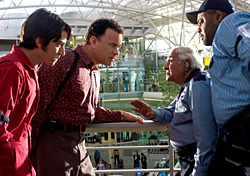
5. The Gift of Listening to Others
In Who Cares? Marcy Heidish observes: "Listening is the gift you give to someone in difficulty or distress, in the midst of a crisis or a problem. Unfortunately, it seems to be a half-forgotten gift. Sometime, someplace, every one of us has heard these words: 'All I wanted was someone to listen.' If the language of listening has grown foreign to many, I believe we can re-learn it. As humans, we have a good ear for it, still."
- Viktor is a good listener, someone who is present in the fullest sense of the word. Which of the many members of his extended airport workers family is lucky enough to receive his gift of listening? Which characters in the film are not good listeners? What difference does their lack of this skill make?
- All of us have come across individuals who treat us like we are the only people on the planet when they are with us. Who is your model for being a good listener? When was the last time you heard someone use the phrase, 'All I wanted was for someone to listen'?
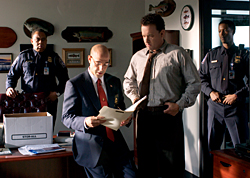
6. Difficult People
In Thank You for Being Such a Pain: Spiritual Guidance for Dealing With Difficult People, Mark Rosen uses the following teaching tale: "There is a story about the mystical teacher Gurdjieff and one of his disciples. The disciple, who lived in the ashram, was strongly disliked by the other disciples for a variety of reasons. When he left, Gurdjieff actually tracked him down and paid him to return, telling the rest of the disciples that the ostracized man was one of their most important teachers." Rosen then derives a spiritual practice from this story: "The next time a difficult person comes into your life, it might be helpful to tell yourself something along the lines of '(Sigh) Here comes another one. God, I ask you to guide me. You sent this person to me for a reason. Help me to know what it is, and help me to cope successfully.' "
- In what ways are Viktor and Dixon total opposites in terms of their personalities? Why does the airport officer get so upset by the man without a country's behavior and activities? If Dixon had treated Viktor as a teacher at an important transitional point in his life, what could he have learned about himself?
- On a scale of 1 to 10, how well do you deal with difficult people? Have you ever learned anything important about yourself from someone with whom you were in conflict or someone who just irritated you? What was it? Try the spiritual practice suggested by Mark Rosen during the next week.
7. Waiting as A Spiritual Practice
"Being made to wait has another benefit. It helps us figure out what we truly want and what really matters to us. Remembering that some things are worth waiting for helps us to decide what it is that is worth the wait, and to prize it truly when we do receive it," M. J. Ryan writes in The Power of Patience.
- Viktor is a person who has every reason in the world to be raging about his plight as a man without a country. Yet somehow he has learned how to wait. It is a special attribute of saints and other extraordinary souls who are not consumed by expectations and grasping for the next best thing. What does Viktor's special mission tell you about his capacity to wait for something that us worth the wait? What does Viktor learn about himself and about America in his nine-month sojourn in the international transit lounge?
- What have you waited for that turned out to be all that you expected and more? Who have been your mentors in the art of waiting? One of ours is by Rebbe Nachman of Breslov, the Hasidic seer. Use his prayer the next time you find yourself waiting:
"God of patience,
teach me
patience.
Help me learn
to wait —
for the good
that is just around the corner;
for the assistance
that will soon be within my reach;
for the relief
that is just a moment away."
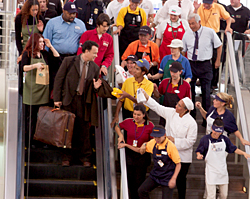
This guide is one in a series of more than 200 Values & Visions Guides written by Frederic and Mary Ann Brussat. Text copyright 2004 by Frederic and Mary Ann Brussat. Photos courtesy of Dreamworks Pictures. This guide is posted as a service to visitors to www.SpiritualityandPractice.com. It may not be photocopied, reprinted, or distributed electronically without permission from Frederic and Mary Ann Brussat. For this permission and for a list of other guides in the Values & Visions series and ordering information, email your name and mailing address to: brussat@spiritualrx.com.
